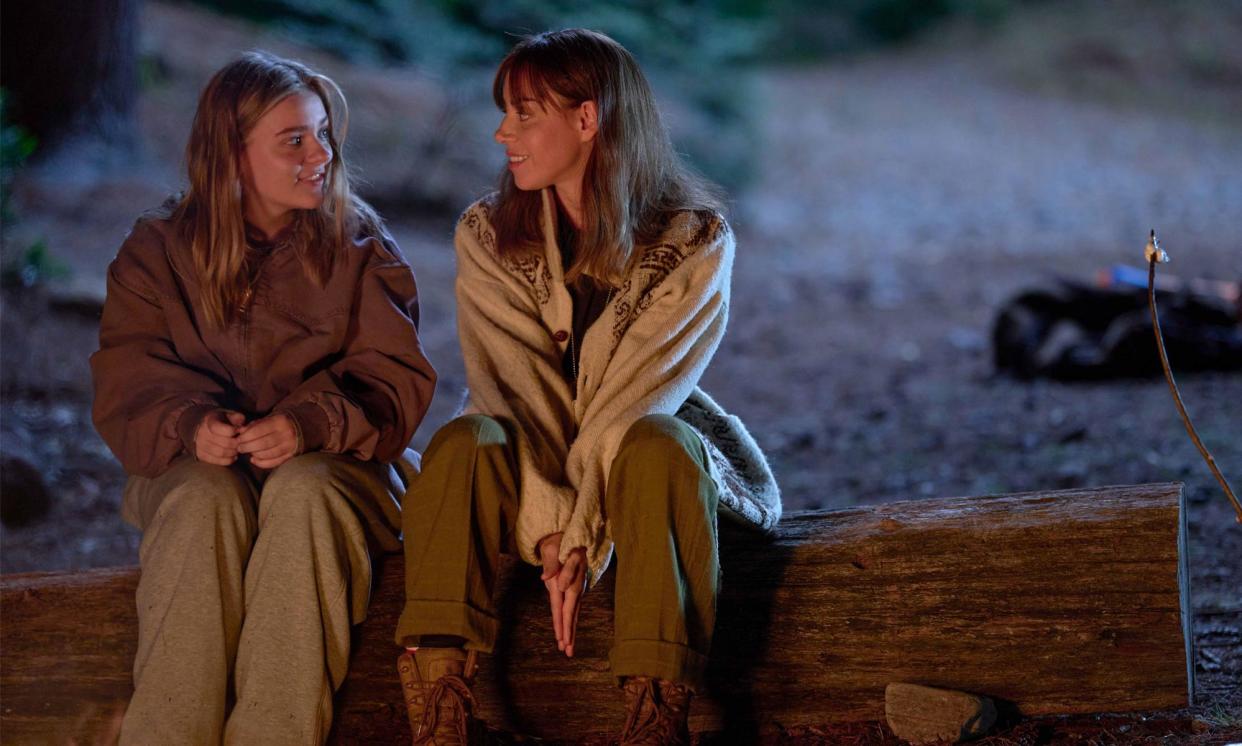My Old Ass review – charmingly shaggy high-concept comedy

There are shades of Petite Maman and All of Us Strangers in the slickly packaged, Margot Robbie-produced Sundance comedy My Old Ass, taking a similarly magical high-concept “what if?” but with a far frothier touch. Premiering at a coveted big Saturday night slot, it arrives during a festival that has buyers on high alert, schedules lightened by last year’s strikes pausing production. While the old-fashioned Sundance crowd-pleaser might have become less commercially viable in recent years thanks to both audience and industry shifts (films like Blinded by the Light, Late Night, Brittany Runs a Marathon and Flora and Son going from big sales to little audiences), it still feels like an easy win, easily winning over a packed-out cinema of festival-goers.
Related: Exhibiting Forgiveness review – André Holland powers moving father-son drama
Set in those emotionally complicated few weeks before the first year of college, My Old Ass centres on Elliott (Maisy Stella), a queer teen living in the idyll of the Muskoka Lakes in Canada (the film doubles up as a persuasive tourism ad). Choosing to spend her remaining days hooking up with a local girl and getting high, she leaves her family to anxiously await her departure alone, believably selfish rather than monstrous teen behaviour. When Elliott takes some mushrooms with her two closest friends, she’s met with her older self (Aubrey Plaza), a head-scratcher that she chalks up to the trip rather than a crack in the the fabric of the universe. But when she returns to the sober light of day, she finds that her future self has left her number in her phone and the two engage in a phone relationship, the older Elliott trying to impart wisdom.
Along with the more expected advice about strengthening relationships with the family members she has taken for granted, younger Elliott is told above all else to stay away from Chad, a befuddling priority that becomes impossible when she finally meets him. How could someone so seemingly flawless be such catastrophically bad news?
What follows is a shaggy and immensely likeable comedy, playing out as if it were based on a slightly cruder than usual YA novel. Actor turned film-maker Megan Park, acting as both writer and director, smartly makes Elliott’s last few weeks feel refreshingly low-stakes – she isn’t some hellish teen rampaging against her loving family, but just a slightly thoughtless one in need of only minor tweaks rather than some major makeover. Park’s first movie (delicate school shooting drama The Fallout) had shown an impressive knack for nailing the specific rhythms of teen speech – unforced, real and undressed – and despite subject matter that others either avoid completely or give a pat PSA glow, she found truth in the face of possible cliche. Things are far more heightened here, but Park displays a similar ability to ground material that others would have made impossible to fully believe. As fantastical as things get, she finds a tone that both embraces the goofiness of the setup while also selling us on how real people handle an unreal situation.
The life lessons that Park is leading us to are never unexpected – appreciate the freedom of youth, embrace what mistakes can teach you, be nicer to your parents – but that doesn’t make them any less effective and as the last act comes into view, Park pushes the film’s sad-around-the-edges melancholy into the spotlight. There’s a surprisingly grand emotional punch, arriving suddenly and landing with force. While it’s pegged to a reveal that we’ve seen before, it’s handled so well that it is impossible not to be moved, a thoughtful reflection on what really constitutes a bad life choice.
I’d argue that some of the relationships are a little rushed (the film could have benefitted from a longer runtime, arguably one of the greatest compliments at a time of such bloat), with Elliott’s relationship to her parents in need of a few more beats. A scene between Elliott and her mother (a wonderful Maria Dizzia) is sad and lovely, a familiar wrench of having to let go of someone and allow that relationship to mature and change, but more of that wouldn’t have gone amiss. Stella is a sensational find, known mostly for her role in TV’s Nashville, a smart and instinctive young actor with a roughness around the edges that separates her from the slick unnaturalness of the many grown-up Disney kids that act as her industry peers (she’s also a fantastic singer, which leads to a sweet Justin Bieber-inspired sequence). Plaza, who has really found herself as an actor at Sundance delivering her finest, most revealing work in films like Ingrid Goes West and Emily the Criminal, is fantastic – the kind of A-game performer who really never misses, and the pair have a real, tender rapport.
Rather like recent sleeper hit Anyone But You, it also looks as glossy and poppy as a studio comedy from the 2000s, a rich treat at a time when that has become the rare exception rather than the rule. It deserves to find an equally big audience, for asses both young and old.
My Old Ass is showing at the Sundance film festival and is seeking distribution.

 Yahoo Movies
Yahoo Movies 
